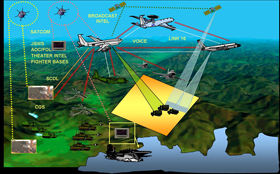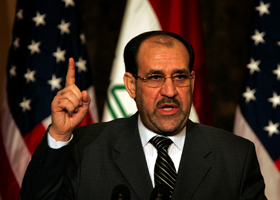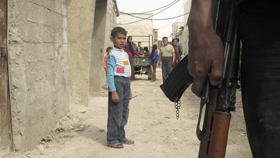As international worries deepen over developments in Syria and Mali, the West must be cautious about leading the pack when it comes to saying what should be done. Because the events now playing out in Syria and Mali are, in no small part, the unintended consequences of American, British and French foreign policy in Afghanistan, Iraq and Libya, unintended consequences due largely to failures of strategic thinking.
The Afghanistan and Iraq interventions – unintended consequences in Syria
In Afghanistan in 2002 the Americans with NATO backing launched themselves into a desired short war, and with right intention. And, in the early days, things appeared to go well. Supported by overwhelming air power from USN aircraft carriers, the Northern Alliance and US Special Forces quickly toppled the Taliban. But two failures of strategic thinking by the neocon-dominated US Administration would lead the West astray.
First, the neocons failed to recognise that in Afghanistan they were supporting one side of a dormant but delicately poised civil war, between the Pashtun-Taliban and the Tajek-led Northern Alliance. And that, by coming in with such overwhelming force, they shifted the balance of military power so overwhelmingly in favour of the Northern Alliance that their operational triumph was not only decisive but also deceptively swift.
Second, as these events played out, neocons arrived at two incorrect conclusions: they believed that the Taliban had been defeated, whereas they had only been deposed; and they deduced, wrongly, that the swiftness of the victory was due to new ways of war – the vogue term was network-centric warfare.
Thus, with Afghanistan all but won and the new network-centric warfare tool in their armoury, and with the backing of the Blair Government in London, the neocons set off to complete America’s unfinished business in Iraq, through the device of another swift network-centric war. It was a costly mistake strategically, as events in Iraq and Afghanistan proved, but also a costly mistake grand strategically, as events in Syria are now showing.
Because in Iraq in 2003 the Americans with Britain’s support unwittingly engaged in an inter-generational dual-axis civil war within Islam – one axis between reformist and conservative, the other between Sunni and Shia. And through military intervention and then the democratic mechanism of the ballot box, they changed the balance of power in this key Sunni-Shia state, from Sunni-led minority regime to Shia-led majority government. And they thus transformed the subtle regional dynamics in Islam’s inter-generational civil war.
Syria has become the opportunity for the Sunni to redress their Iraq setback. It should come as no surprise that the majority-Sunni uprising in Syria has the full support of Sunni-led administrations in Saudi Arabia and Qatar. And it should come as no surprise that the only Arab League members who have not supported the Syrian uprising are the Shia-led states of Iraq and Lebanon. Saudi-led support will be relentless, and the Romany-like Allawites backed by their Iranian allies will fight on to the end, calculating that they will be slaughtered if they do not.
The Libya intervention – unintended consequences in Syria and Mali
In Libya in 2011, Prime Minister Cameron’s and President Sarkosy’s administrations fell into the same trap as President Bush’s and Prime Minister Blair’s administrations in Iraq in 2003. As evidenced in their military actions, Cameron’s Britain and Sarkosy’s France pursued a political objective of regime change, notwithstanding that the UN mandate (in Libya) was to protect civilians (or ‘stop slaughter’ to use David Cameron’s often repeated phrase).
And as was predicted in written evidence to the Britain’s House of Commons Defence Committee in September 2011, a foreseeable consequence of this policy was that ‘key non-Western countries – particularly Russia and China – who are uncomfortable with the idea of interference by the international community in internal activities of sovereign states would, in the future, be less willing to sanction UNSCRs argued for genuine humanitarian reasons.’ This is not the sole reason for the lack of Russian and Chinese support for Western initiatives in Syria – but it is a key contributory factor.
For a UN intervention in Syria to have any chance of preventing further bloodshed, it would need sanction in the Security Council, which – thanks in no small part to US and British actions in Iraq, and French and British actions in Libya – is a distant prospect. Furthermore, boots on the ground would be essential to stop the civil war, and it is difficult to see from where the volunteers would be drawn. Even if there were vital national interests at stake in Syria, Western politicians and populaces have, post Afghanistan and Iraq, grown weary of intervention. Forces drawn from Sunni or Shia nations would be conflicted. So too, would those drawn from Israel. And from Turkey whose reticence, despite recent provocations, is a function of her Kurdish complications. Thus the military-strategic cupboard looks bare.
The modern idea of the International Community having a ‘responsibility to protect’ is all very well, but to exercise such a responsibility we need the ‘capacity to protect’, which in Syria, without Security Council sanction backed by deployable force, we do not. So, we will have sit on our hands and, from the sidelines, help other regional players contain the unfolding Syrian tragedy as best they can.
And the unintended consequences of Britain’s and France’s Libyan intervention are also playing out in Sub-Saharan Africa. As Ross Douthat of the New York Times pointed out as long ago as July 2012:
‘… Weapons and fighters from the Libyan war have moved easily across Algeria into Mali since Colonel Qaddafi’s fall, transforming a long-simmering insurgency into a multi-front civil war.’
Six months on, it is noteworthy that support from Obama and Cameron for Hollande’s bold move into Mali has been long on political words and short on military substance. But as Hollande embarks on his first war as French President, Obama’s and Cameron’s reticence may not be so surprising if both have learned the lesson of unintended consequence. Let us hope they have, because, to follow on Ross Douthat’s prescient analysis:
‘… From a strategic perspective, too, toppling a dictator in one country looks rather less impressive if his fall helps give rise to a theocracy nearby …’
Just so. Specific links between Libya and the recent terrorist action against the Algerian gas facility are less obvious but, whether or not this attack was launched by an Al Qaeda in the Maghreb breakaway as Roula Khalef of the Financial Times reports, the impact of the Libyan intervention on North African political atmospherics can surely not have helped:
‘Dictatorial regimes and their all powerful intelligence services have been replaced by weak authorities struggling to assert themselves.’
In any case, the unanticipated events in Syria, Mali and Algeria should cause us to act much more cautiously, when considering interventions in the future.
Primum non nocere
Indeed, in the light of our lack of strategic foresight, when considering future interventions, the first principle the West should take to heart is the medical notion of primum non noncere, ‘first do no harm’. If in doubt about the underlying dynamics of a state of concern or uncertain of the consequences of an intervention, then our default position should be to sit on our hands.
And, whilst we sit on our hands, we should examine the more fundamental question of whether neo-liberal intervention in cultures that, as recent evidence clearly shows, we do not understand – be it with military force or development aid – makes any grand strategic sense whatsoever.
The Broader Strategic Context
There are, furthermore, bigger geopolitical events afoot. The Afghanistan project has to be drawn to a close and America, Britain and NATO need to recapitalise their military capabilities, as best they can within the necessary fiscal spending limits imposed by their ongoing debt crises. More broadly, the West needs, with the Russian, Chinese and other G20 partners, to think through events unfolding in the Arabian Gulf and, for Europeans, within the EU, all more central to our collective national interests than Syria and Mali.
What would the West’s position, for example, in the event of war breaking out between Israel and Iran, given the likely implications of closure of the Arabian Gulf for (already high) oil prices and a global economy on the brink of a second recession.
And what would be NATO’s position on a request from the Greek government for military assistance in the event of a breakdown in national order following catastrophic economic failure?
Both increasingly plausible scenarios and both much more central to international security than the Syrian and Malian crises, morally reprehensible though the unfolding events in both places unquestionably are.
Conclusion
Last but by no means least, the West would do well to think through the key question: why have recent strategic outcomes been so different to those that our foreign policy sought to deliver? Some will cite as explanation the words of Harold Macmillan, British Prime Minster between 1957 and 1963 – “Events, my dear boy, events” – but for me, there are two more fundamental causes.
First is an increasing Western reversion to easy political short-termism, driven by political classes and popular presses that have neither the insight and capacity nor the will for difficult grand strategic long-termism.
Second, as has become clear to the British House of Commons Public Administration Select Committee, is a lack of capacity at the top of most Western governments for hard-edged strategic thinking, for which the evidence is increasingly clear.
In 1963, the French General Andres Beaufré wrote:
‘In war the loser deserves to lose because his defeat must result from errors of thinking, made either before or during the conflict.’ [1]
There is, I judge, no better explanation of the failed and failing outcomes of the West’s modern interventions.
1. Andres Beaufré, An introduction to strategy, tr. Richard Barry, London, 1963. p.133.








